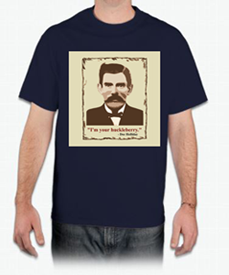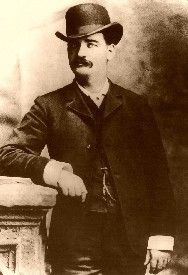By W.R. (Bat) Masterson in 1907
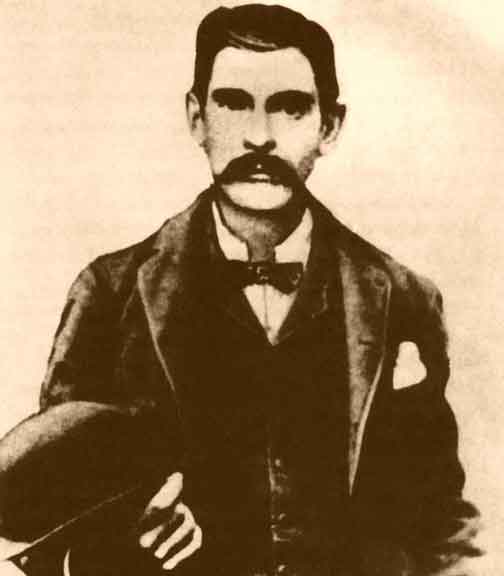
Doc Holliday
While he never did anything to entitle him to a statue in the Hall of Fame, Doc Holliday was nevertheless a most picturesque character on the western border in those days when the pistol instead of law courts determined issues. Holliday was a product of the state of Georgia, and a scion of a most respectable and prominent family. He graduated as a dentist from one of the medical colleges of his native state before he left it, but did not follow his profession very long after receiving his diploma. It was perhaps too respectable a calling for him.
Holliday had a mean disposition and an ungovernable temper, and under the influence of liquor was a most dangerous man. In this respect he was very much like the big Missourian who had put in the day at a cross-road groggery, and after getting pretty well filled up with the bug juice of the Moonshine brand, concluded that it was about time for him to say something that would make an impression on his hearers; so he straightened up, threw out his chest and declared in a loud tone of voice, that he was “a bad man when he was drinking, and managed to keep pretty full all the time.” So it was with Holliday.
Couldn’t Have Whipped a Boy
Physically, Doc Holliday was a weakling who could not have whipped a healthy 15-year-old boy in a go-as-you-please fist fight, and no one knew this better than himself, and the knowledge of this fact was perhaps why he was so ready to resort to a weapon of some kind whenever he got himself into difficulty. He was hot-headed and impetuous and very much given to both drinking and quarreling, and, among men who did not fear him, was very much disliked.
He possessed none of the qualities of leadership such as those that distinguished such men as H. P. Myton, Wyatt Earp, Billy Tilghman and other famous western characters. Holliday seemed to be absolutely unable to keep out of trouble for any great length of time. He would no sooner be out of one scrape before he was in another, and the strange part of it is he was more often in the right than in the wrong, which has rarely ever been the case with a man who is continually getting himself into trouble.
The indiscriminate killing of some negroes in the little Georgia village in which he lived was what first caused him to leave his home. The trouble came about in rather an unexpected manner one Sunday afternoon –unexpected so far at least as the negroes were concerned. Near the little town in which Holliday was raised, there flowed a small river in which the white boys of the village, as well as the black ones, used to go in swimming together. The white boys finally decided that the negroes would have to find a swimming place elsewhere and notified them to that effect. The negro boys were informed that in the future they would have to go further down the stream to do their swimming, which they promptly refused to do and told the whites that if they didn’t like existing conditions, that they themselves would have to hunt up a new swimming hole.
Shot a Crowd of Negroes
As might have been expected in those days in the South, the defiant attitude taken by the negroes in the matter caused the white boys to instantly go upon the warpath. They would have their order obeyed or know the reason why. One beautiful Sunday afternoon, while an unusually large number of negroes were in swimming at the point in dispute, Holliday appeared on the river bank with a double-barreled shotgun in his hands, and, pointing it in the direction of the swimmers. ordered them from the river.
“Get out, and be quick about it,” was his peremptory command. The negroes, as a matter of course, stampeded for the opposite shore, falling over each other in their efforts to get beyond the range of the shotgun. Holliday waited until he got a bunch of them together, and then turned loose with both barrels, killing two outright, and wounding several others.
The shooting, as a matter of course, was entirely unjustifiable, as the negroes were on the run when killed; but the authorities evidently thought otherwise, for nothing was ever done about the matter. Holliday. afterward in speaking about the occurrence, justified the deed on the broad grounds that the “n***ers” had to be disciplined, and he knew of no more effective way of doing it than with a shot-gun. His family, however, thought it would be best for him to go away for a while and allow the thing to die out; so he accordingly pulled up stakes and went to Dallas, Texas, where he hung out his professional sign bearing the inscription. “J. H. Holliday, Dentist.” This was in the early seventies and at the time when Dallas was a typical frontier town in everything the term implied. A stranger in Dallas in those days could get anything he wanted from pitch and toss to man-slaughter at any hour of the day or night, and that was exactly what suited the Georgia dentist.
Gambling was not only the principal and best-paying industry of the town at the time, but it was also reckoned among its most respectable and, as the hectic Georgian had always shown a fondness for all things in which the elements of chance played an important part, his new environment furnished him with no cause for complaint. In a short time those who wished to consult professionally with the doctor had to do so over a card table in some nearby gambling establishment, or not at all. While Holliday never boasted about the killing of the negroes down in Georgia, he was nevertheless regarded by his new-made Texas acquaintances who knew about the occurrence, as a man with a record; and a man with a record of having killed someone in those days, even though the victim was only a “n***er,” was looked upon as something more than the ordinary mortal; wherefore the doctor on that account was given instant recognition by the higher circles of society in Dallas.
A Poker Game Incident
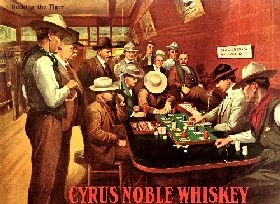
Cyrus Noble Whiskey Ad showing Faro Players
If there was any one thing above another Holliday loved better than a session in a poker game, it was conflict, and, as Dallas was the home of conflict, the doctor was in his element. It was not a “n***er” that he shot this time, but a white man of some local prominence for which he had to emigrate to some more congenial place. He brought up next at Jacksborro, a small, out-of-the-way place just off the Fort Richardson Military Reservation, on the north-western border of the state, where civilization was only in a formative stage.
The doctor had by this time heard much about the man-killers who abode on the frontier, and regarded himself as well qualified to playa hand among the foremost of the guild. He was not long in Jacksborro before he was in another scrape. This time it was with a soldier who was stationed at the Fort, and who had been given permission to visit the town by his commanding officer.
The trouble was over a card game in which the soldier claimed he had been given the worst of it by the man from Georgia. This, of course, necessitated the fighting Georgian taking another trip on the road, for he knew it would never do to let the soldiers at the Fort capture him, which they would be sure to try to do as soon as word reached them about the killing of their comrade. He, therefore, lost no time in getting out of town, and, seated on the hurricane deck of a Texas cayuse, was well on his way to safety by the time the news of the homicide reached the Fort. It was a long and dangerous trip that he mapped out for himself on this occasion.
His Career in Denver
From Jacksborro to Denver, Colorado, was fully 800 miles, and, as much of the route to be traversed through was the Texas Panhandle and no-man’s land, which was in those days alive with Indians none too friendly to the white man, and renegade Mexicans from New Mexico, the journey was a most perilous one to take; but the doughty doctor was equal to the task and in due time reached Denver without either having lost his scalp or his desire for more conflict. This was in the summer of 1876 and while Denver was a much more important city than Dallas, its local government was conducted on very much the same principles. Like Dallas, everything went in Denver, and the doctor, after looking the situation over for a day or two, concluded that he had lost nothing by the change.
In all respects, the Rocky Mountain town looked good to him, and as he had set out to build up a record for himself as a man-killer, he did not purpose lying idle very long. While Denver, in many respects in those days was a rough and ready town, it nevertheless enforced to the very letter the ordinance against the carrying of firearms, and Holliday, for the once becoming prudent, put his canister aside, but straightway went and bought himself a murderous-looking knife. Thus heeled, he did not long delay in getting into action, and in so doing, carved up the face and neck of one Bud Ryan, a quiet and gentlemanly looking sport, in a frightful manner. Bud Ryan still lives in Denver and carries around with him the marks of his run-in with the fighting Holliday more than thirty years ago. It was again the doctor’s turn to take the road and escape from the scene of his recent malefaction, and this time he headed for Dodge City, Kansas. It was there I first met him, although I had heard about his doings in Texas.
He was slim of build and sallow of complexion, standing about five feet ten inches, and weighing no more than 130 pounds. His eyes were of a pale blue and his mustache was thin and of a sandy hue. Dodge City was then very much like Dallas and Denver, only a little more so, and the doctor did not express regret at having come. It was easily seen that he was not a healthy man for he not only looked the part, but he incessantly coughed it as well. During his year’s stay at Dodge at that time, he did not have a quarrel with anyone, and, although regarded as a sort of grouch, he was not disliked by those with whom he had become acquainted. It was during this time that he also made the acquaintance of Wyatt Earp and they were always fast friends ever afterward.
His Friendship with Wyatt Earp
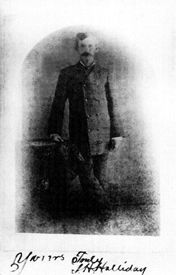
Doc Holliday in 1879
He went from Dodge to Trinidad, Colorado, where, within a week from the time he landed, he shot and seriously wounded a young sport by the name of Kid Colton, over a very trivial matter. He was again forced to hunt the tall timber and managed to make his escape to Las Vegas, New Mexico, which was then something of a boom town, on account of the Santa Fe Railroad having just reached there. Holliday remained around Las Vegas for some time, doing the best he could in a gambling saloon; then he had a quarrel with one of the town rounders by the name of Mike Gordon, whom he invited to step outside of the saloon in which they were quarreling. No sooner had Gordon stepped from the door than Holliday shot him dead. From Las Vegas to Dodge City across the country, without following’ the traveled road, was about five hundred miles and this was the trip Holliday was again compelled to make on horseback in order to get away from the authorities who were hot on his trail.
He reached Dodge City in safety and remained there until Wyatt Earp took him in his covered wagon to Arizona in the fall of 1880. Again he showed no disposition to quarrel or shoot while he lived in Dodge, and many thought that much of the trouble he had been having in other places had been forced upon him, but I am satisfied that it was pretty much all of his own seeking. His whole heart and soul were wrapped up in Wyatt Earp and he was always ready to stake his life in defense of any cause in which Wyatt was interested. He aided the Earp brothers in their street fight in Tombstone, against the Clanton and McLaury brothers, in which the latter two were killed, along with Billy Clanton.
It was Doc Holliday, who, along with Wyatt Earp, overtook and killed Frank Stillwell at the railroad station in Tucson for having participated in the murder of Morgan Earp in Tombstone. He was by Wyatt’s side when he killed Curly Bill at the Whetstone Springs outside of Tombstone. Damon did no more for Pythias than Holliday did for Wyatt Earp.
After Wyatt and his party had run down and killed nearly all their enemies in Arizona, Holliday returned to Denver, where he was arrested on an order from the Arizona authorities, charged with aiding in the killing of Frank Stillwell. This happened in the spring of 1882. I was in Denver at the time and managed to secure an audience with Governor Pitkin who, after listening to my statement in the matter, refused to honor the Arizona requisition for Holliday. I then had a complaint sworn out against Holliday, charging him with having committed a highway robbery in Pueblo. Colorado, and had him taken from Denver to Pueblo, where he was put under a nominal bond and released from custody. The charge of highway robbery made against Holliday, at this time, was nothing more than a subterfuge on my part to prevent him from being taken out of the state by the Arizona authorities after Governor Pitkin went out of office, but the Colorado authorities did not know it at the time. Holliday always managed to have his case put off whenever it would come up for trial, and, by furnishing a new bond, in every instance would be released again.
When he died at Glenwood Springs a few years afterward, he was still under bond to answer to the charge of highway robbery I had caused a certain person to prefer against him. Doc Holliday, whose right name was John H. Holliday. lived during his stormy career in three states of the Union besides the one in which he was born, and in two territories; namely Texas, Colorado, and Kansas, and in the territories of New Mexico and Arizona. Besides the killing of the negroes in the river in his hometown, he shot a man in Dallas, Texas, and killed another in Jacksboro. He stabbed Bud Ryan in a frightful manner in Denver, Colorado, and shot another in Trinidad in the same state. He killed a man in Las Vegas, New Mexico, and was directly connected with several killings in Arizona.
Kansas, it will be observed, was the only state in which he had lived in which he failed to either slay or bodily wound some person. The question as to the extent in which he was justified in doing as he did, is, of course, open to debate. I have always believed that much of Holliday’s trouble was caused by drink and for that reason held him to blame in many instances. While I assisted him substantially on several occasions, it was not because I liked him any too well, but on account of my friendship for Wyatt Earp who did.
Holliday had few real friends anywhere in the West. He was selfish and had perverse nature-traits not calculated to make a man popular in the early days on the frontier.
Bat Masterson, 1907. Compiled by Kathy Weiser/Legends of America, updated November 2019.
About the Author and Notes:
Though most of us know that W.B. “Bat” Masterson was famous as a gunfighter and friend of such characters as Wyatt Earp, Doc Holliday, and Luke Short, many may not know that he was also a writer. After his many escapades in the American West, he accepted a post of U.S. Marshal in New York state. However, by 1891 he was working as a sports editor for a New York City newspaper. In 1907 and 1908 he wrote a series of articles for the short-lived Boston magazine, Human Life. This tale of Doc Holliday, was just one of several of those articles. Masterson died in 1921 of a heart attack. *The article that appears on these pages is not verbatim, as it has been very briefly edited, primarily for spelling and grammatical corrections.
Also See:
John Henry “Doc” Holliday – Deadly Doctor of the Frontier
Dodge City – A Wicked Little Town
Wyatt Earp – Frontier Lawman of the American West

